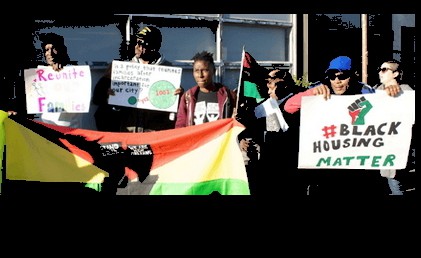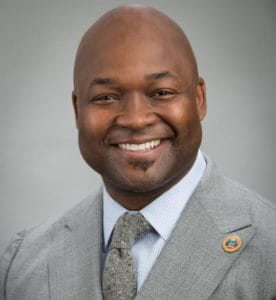One in 7 Adults in New Orleans Has a Warrant Out for Arrest, New Data Shows
Richard A. Webster, Washington Post, September 23, 2019
{snip}
Fifty-two arrestees, outfitted in orange and maroon jumpsuits, await their first appearance before a judge. Most are black. All require a public defender. And more than half of them are here, their hands chained against their stomachs, because they missed a court date for a minor crime, triggering an arrest warrant.
{snip}
There are more than 56,000 outstanding warrants in New Orleans’s Municipal Court, dating to 2002, according to city data. A staggering 1 of 7 adults in the country’s 50th-largest city have a warrant out for their arrest.
Typically, the crime is failing to appear for scheduled court dates for minor, nonviolent offenses that do not carry a jail sentence, including panhandling and fishing without a license. (Two notable exceptions are battery and domestic abuse, which account for roughly 6 percent of all the warrants.) {snip}
Now, a coalition of elected officials, local civil rights organizations such as Stand With Dignity and the public defender’s office is proposing a more permanent solution – wiping out nearly all 56,000 warrants, in addition to any debt accumulated from fines and fees.

“Stand with Dignity is a grassroots membership organization of African American workers and families.”
If successful, New Orleans would be at the forefront of a growing movement to curb the use of warrants and the threat of arrest when the underlying charge might be little more than public intoxication. {snip}
“We need to consider all the damage this has caused and the psychological trauma it continues to impose on the minds and hearts and confidences of 14 percent of our population,” said City Council member Jason Williams. “This is New Orleans’s working poor. This is the hospitality community, musicians. These are people who are some of the reasons why people come to New Orleans in the first place.”

Jason Williams
Williams will introduce a resolution at the council’s meeting Wednesday calling for the dismissal of all warrants and charges associated with crimes of poverty and homelessness, such as obstruction of a public passageway and trespassing. These account for more than 40 percent of warrants. San Francisco’s criminal courts implemented a similar strategy in 2016, and in July, Los Angeles Police Chief Michel Moore announced interest in it.
Williams will also call for the clearing of warrants issued post-conviction, which are most likely to be tied to someone’s inability to pay fines or fees. And he will ask the city to forgive all of the associated debt.
{snip}
Not everyone is on board with eradicating every outstanding warrant. Paul Sens, chief judge of the Municipal Court, said he prides himself on operating “one of the most progressive courts in the United States,” but he worries that blanket amnesty would send the wrong message.
“There are a lot of people who come into this court and do what’s expected of them,” Sens said. “So why did this guy who’s got 20 cases and $5,000 worth of fines get his wiped out and they didn’t? It’s a balancing act you have to do.”
{snip}
Bill Quigley, director of the law clinic at Loyola University, said that provides little comfort to the black citizens of New Orleans, who are more likely to have frequent and unpleasant encounters with the police.
“Things that are discretionary in the criminal justice system in New Orleans are always exercised at the expense of people of color and people without economic resources,” Quigley said. “Not so much if you’re a white law professor at Loyola.”
{snip}
Questions about municipal warrants and their impact on public safety intensified after Michael Brown was shot to death by a police officer in 2014 in Ferguson. A subsequent Justice Department investigation of the city’s police department found that more than 16,000 people had outstanding municipal warrants in a city of 21,000 people – and those warrants were “almost exclusively” used as a threat to generate revenue from poor, black communities through fines and fees, which they could not afford to pay. Five months later, Ferguson Municipal Court Judge Donald McCullin recalled all warrants issued in the city before Dec. 31, 2014, which amounted to nearly 10,000.
{snip}
Lisa Foster, co-director of the Fines and Fees Justice Center in New York, worked for the Justice Department at the time of the Ferguson report. She said that most people miss court because they simply forget, don’t have reliable transportation or child care, or can’t afford to miss work. Many are unable to pay their fines, so they stay away out of fear they will be arrested. “We criminalized a lot of conduct over the last few decades that we may want to go back and think about,” Foster said. “We also know everybody speeds sometimes or rolls through a stop sign, but who gets caught tends to be people where there are a lot of police. And that’s overwhelmingly communities of color.”
{snip}
One of her clients, Kendell Morgan, 33, was pulled over in February for a broken taillight. The officer ran his name, saw he had an outstanding warrant in St. Charles Parish for a $219 speeding ticket and arrested him. Morgan was held in the New Orleans jail for seven days, then extradited to the St. Charles Parish jail. He was released only after his wife scraped together enough money to pay the ticket.
{snip}















